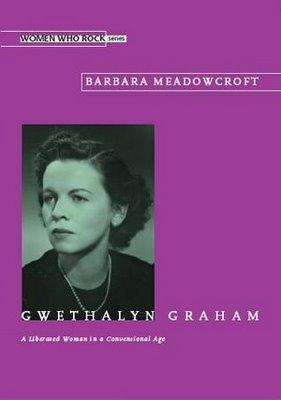Gwethalyn Graham: A Liberated Woman in a Conventional Age

Barbara Meadowcroft promises in her introduction to Gwethalyn Graham: A Liberated Woman in a Conventional Age that this book is no definitive biography. How refreshing! Can there really be such a thing anyway? She argues that no one is ever truly known “even, or especially, to those closest to them,” and I would agree. It’s in this vein that she invites her “readers to view [the book] as they would a sketch in which the gaps in the pattern must be filled by their own imagination.” Meadowcroft does a wonderful job piecing together bits and pieces of her research to give us some insight into who this complicated and conflicted woman was—not just publicly, but privately.
Gwethalyn Graham is credited with almost singlehandedly putting Canada on the literary map. Until the wildly successful publication of Earth and High Heaven in 1944, Canada stood in the literary and cultural shadow of the United States and Europe. Graham’s book—a powerful novel about the love affair between a Christian woman and a Jewish man—was revolutionary at the time as it was the first book to openly confront the anti-Semitism of wartime Canada. It was the first Canadian book to make it to the number one spot on the New York Times' Bestseller List, where it stayed for thirty-seven weeks. Graham won two Governor-General’s Literary Awards for her work. She was a social activist who wrote and campaigned tirelessly to expose injustices in her beloved Canada. And yet, she remains largely unknown, having slipped into relative obscurity after her second marriage, then tragically dying of brain cancer at fifty-two years old.
In Gwethalyn’s time, she was a renegade. She was outspoken about her beliefs on anti-Semitism, racism, and the revolution tranquille. She traveled widely. She had affairs. She had sex. She (allegedly) had abortions. And, she was a single mother, supporting herself and her son by writing openly about all of these things—practically unheard of at the time.
Meadowcroft’s portrait of Graham isn’t all triumph and independence. Graham was a brilliant artist who experienced some public success, but never quite found happiness personally. She spent much of her life battling poor self-confidence and a negative body image. She always longed for a healthy, happy, lasting, romantic relationship, but she had a habit of choosing adulterous, verbally abusive mates. She was an arguably neglectful mother, leaving her son with friends and nannies for long stretches of time while she went off to work on her writing or to travel through Europe.
Meadowcroft makes no bones about it, Graham made some poor personal choices, but she also cautions against judging Graham. As creative, working women, we still struggle with these issues today, but at least we have role models who came before us. Gwethalyn had none. She was carving out a path. A messy path, but a path nonetheless. As women writers, we all owe Gwethalyn Graham a thank you note.
That was an excellent review, Margaux. You made me want to read this biography. I was all the more intrigued by the life of this incredible feminist because I, as a male writer, have just published a novel about a woman going through her mid-life crisis in the early 80s, who succeeds in freeing herself from the puritanical strait jacket in which she has been imprisoned all her life and in becoming sexually liberated.
Great review, Margaux! I'm taking off a semester from school so I'll actually have time to check this out.Sincerely,Ebony Edwards-EllisFR Editorial Team